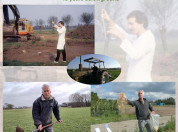Zoeken
Filteren op
Type
Labels
Dossiers
Thema's
Afdelingen
Taal
Active filters
46 zoekresultaten
Zoekresultaten
-
National Growth Fund finances Dutch Holomicrobiome Institute
The government of the Netherlands has allocated €200 million from the country’s National Growth Fund for a public-private consortium that will conduct research into 'microbiomes' and economically interesting applications thereof. In the consortium, NIOO is partnering with ten Dutch universities, five university-medical centres, four universities of applied sciences, many other knowledge organisations and together with dozens of small and large companies and societal organisations.
-
Nationaal Groeifonds financiert landelijk Holomicrobioom Instituut
Het Nederlandse kabinet heeft €200 miljoen uit het Nationaal Groeifonds toegekend aan een publiek-privaat consortium dat onderzoek gaat doen naar ‘microbiomen’ en economisch interessante toepassingen daarvan. De subsidie uit het Groeifonds, bovenop €150 miljoen die de tientallen consortiumdeelnemers zelf bijdragen, ondersteunt de komende tien jaar de activiteiten van een op te richten landelijk ‘Holomicrobioom Instituut’.
-
From Pioneer to Soil Prophet: 40 years belowground - Afscheidssymposium Wietse de Boer
Op donderdag 4 april 2024 nemen we afscheid van onze collega Prof. dr. Wietse de Boer (Afdeling Microbiële Ecologie bij het NIOO-KNAW en Wageningen University) met het Afscheidssymposium 'From Pioneer to Soil Prophet: 40 years belowground'.
-
From Pioneer to Soil Prophet: 40 years belowground - Farewell symposium Wietse de Boer
On Thursday April 4 we'll have the Farewell Symposium and reception for our long-time colleague Prof. Dr Wietse de Boer (Department of Microbial Ecology at NIOO and Wageningen University).
-
Restoring and rewilding ecosystems
It is a topical issue and has long been a research interest of NIOO: how do you restore nature? For example, former farmland can be made more suitable for nature again, and areas connected to each other. This approach could also help to mitigate the consequences of climate change. Furthermore, a growing amount of knowledge about rewilding has become available in recent years. It has become clear that, in the long run, rewilding yields strong ecosystems with more biodiversity.
-
Ecosystemen herstellen en verwilderen
Het is een actueel onderwerp en al lang een onderzoeksinteresse van het NIOO: hoe kun je natuur herstellen? Voormalige landbouwgrond krijgt bijvoorbeeld weer een natuurfunctie en gebieden worden met elkaar verbonden. Dit kan ook helpen om de gevolgen van klimaatverandering op te vangen. De laatste jaren komt bovendien steeds meer kennis beschikbaar over ‘rewilding’. Het levert op de lange termijn sterke ecosystemen op met een grotere biodiversiteit, zo blijkt.
-
Postgraduate cursus: New frontiers in microbial ecology & climate change
In November, a five-day course on microbial ecology & climate change will be organised on Schiermonnikoog. Our colleague Eiko Kuramae from the Department of Microbial Ecology and professor at Utrecht University is one of the organisers. -
Postgraduate course: New frontiers in microbial ecology & climate change
In November, a five-day course on microbial ecology & climate change will be organised on Schiermonnikoog. Our colleague Eiko Kuramae from the Department of Microbial Ecology and professor at Utrecht University is one of the organisers. -
Can we train soil microbial communities to promote plant growth?
Microbial communities are vital for ecosystem functions, and utilizing their diversity, particularly in phosphate-solubilising microbial communities, can provide sustainable solutions for agriculture. However, constructing and optimizing these communities present challenges due to complex interactions among microorganisms.
-
Broeikasgassen
De uitstoot van broeikasgassen versterkt klimaatverandering. Bij het NIOO zoeken we uit hoe gassen zoals methaan, CO2 en lachgas ecosystemen beïnvloeden. De uitstoot kunnen verminderen is een groot goed. Onze kennis van de koolstof- en stikstofkringlopen geeft inzicht in het mogelijke succes van maatregelen. In een Nederlands zoetwatermeer of de bodem van een tropisch regenwoud.
